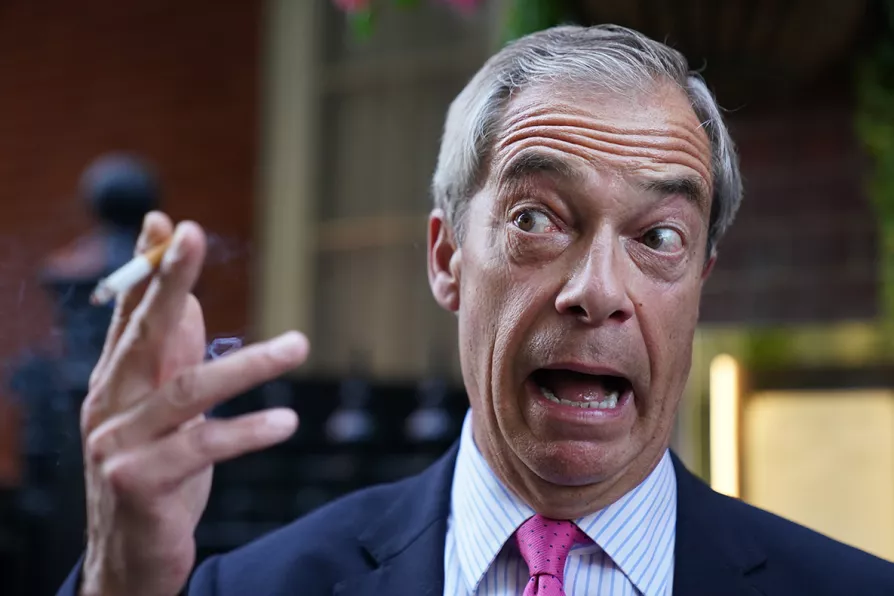Does widespread and uncontrolled use of AI change our relationship with scientific meaning? Or with each other? ask ROX MIDDLETON, LIAM SHAW and MIRIAM GAUNTLETT

 Reform UK leader Nigel Farage smoking outside the Westminster Arms pub in Westminster, London, after Sir Keir Starmer said the government would "take decisions" on a potential outdoor smoking ban in an effort to curb preventable deaths and alleviate pressures on the NHS, August 29, 2024
Reform UK leader Nigel Farage smoking outside the Westminster Arms pub in Westminster, London, after Sir Keir Starmer said the government would "take decisions" on a potential outdoor smoking ban in an effort to curb preventable deaths and alleviate pressures on the NHS, August 29, 2024
IN A few weeks of summer, the political map in Europe has changed.
Electoral systems function as a compromise between the necessity to give the appearance of democratic accountability and to obscure but preserve the truth that power flows from ownership. And that, irrespective of election results, the state exists to maintain this state of affairs.
But in Britain, Germany and France, and a little earlier in Italy, these arrangements have ceased to function.
In Italy, fidelity to the European Union’s imperative to maintain “fiscal responsibility” is assigned to Italy’s permanent eminence grise Mario Draghi.
Sometime prime minister, sometime president of the European central bank (and this week entrusted with perfecting the EU’s military policy) Draghi is not in office, but not without power.
The government is in the hands of a right-wing constellation headed by Giorgia Meloni whose criticism of the Draghi orthodoxy, the EU’s austerity economics and its foreign policy of confrontation with Russia melted away within moments of assuming office.
Her Lega allies, who hold the ministerial economic portfolio, defend fiscal orthodoxy no less doggedly than did Draghi and thus have earned the toleration of the powers that be.
All this was preceded by a weakening of Italy’s proportional electoral system and the introduction of majoritarian elements similar to Britain, similarly to the more or less complete exclusion of the left.
In France, the present presidential system was introduced precisely to weaken the more representative and powerful Assembly that followed liberation. The mighty Gaullist party to which the post-war French bourgeoisie traditionally entrusted the management of the state has now declined into the tiny Republicans party and it is to its irremediably reactionary figure, Michele Barnier, that Macron has gifted the job of prime minister.
Macron’s refusal to accept the victory of the New Popular Front — whose nominee for the office of prime minister would normally be accepted — meant that democratic convention was abandoned and Macron now bids to construct a government of electoral losers dependent on the patronage of Le Pen’s National Rally.
Le Pen offers provisional support for Macron’s new confection with conditions. How much compromise emerges on the Budget depends on how much Le Pen can risk losing the support of her substantial working-class electorate given that during the Assembly election her economics spokesman insisted that National Rally would respect official France’s adherence to EU economic policy.
Thus six decades after the victory over fascism two of the largest European states are governed only to the limits that fascists will tolerate.
Last week’s elections in Eastern Germany saw the parties of the governing coalition humiliated.
Germany’s election system no longer functions to exclude from parliament any party that disputes economic orthodoxy or foreign policy while the big business-orientated neoliberal Free Democratic Party, like the bellicose Greens, fell below the 5 per cent and are out of the state parliaments.
With the far-right AfD topping the poll the question now posed is whether the Establishment right can govern Germany without them.
Like Meloni’s Brothers of Italy, the AfD affects a populist opposition to neoliberal economics and an opposition to the price of the Nato confrontation with Russia.
In another inversion of the cold war and six decades after the Red Army destroyed the Wehrmacht, the far right in Germany is winning elections — not least on a programme of opposition to the costs of war with Russia and to a flow of migrants driven, not least, by Nato bombing of the Middle East.
Mass migration is no accident

Starmer sabotaged Labour with his second referendum campaign, mobilising a liberal backlash that sincerely felt progressive ideals were at stake — but the EU was then and is now an entity Britain should have nothing to do with, explains NICK WRIGHT












